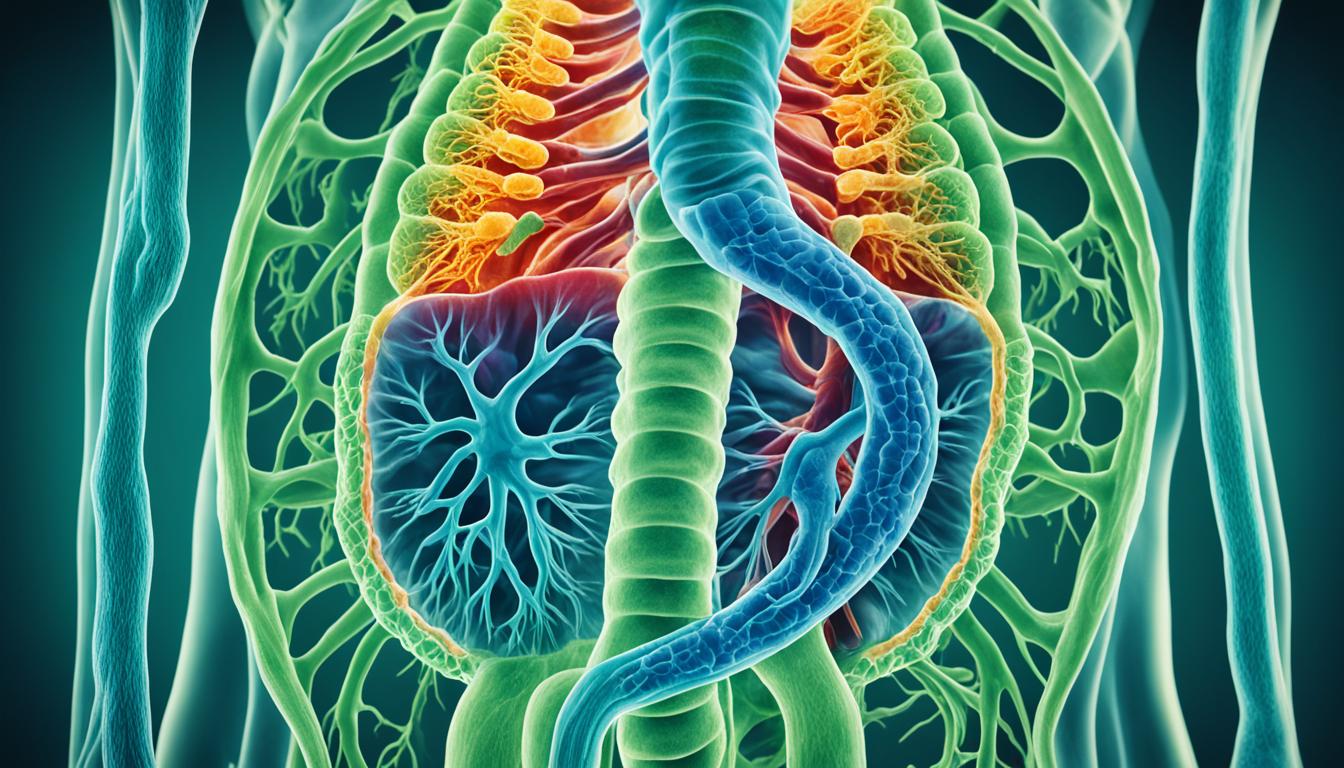Rectal inflammation, or proctitis, leads to soreness in the rectum. Symptoms include pain, bleeding, swelling, and discomfort. Its cause isn’t fully known but is linked to genetics and immune system problems. Conditions like ulcerative colitis or Crohn’s disease are often behind rectal inflammation.
To find out if someone has rectal inflammation, doctors look at their medical history and do a physical exam. Other tests like blood work, scopes, and imaging are also used. Treatments focus on lowering inflammation and managing symptoms. In the past few years, stem cell therapy has shown promise in treating this condition. Stem cells could help repair damaged tissues and improve the immune response in the rectum.
Key Takeaways:
- Rectal inflammation, or proctitis, can cause pain, bleeding, and swelling in the rectum.
- Conditions like ulcerative colitis and Crohn’s disease are common with rectal inflammation.
- Doctors diagnose rectal inflammation through exams and tests.
- Treatments include medicines and changes in lifestyle.
- Stem cell therapy might be effective in healing tissues and easing symptoms.
Understanding Rectal Inflammation and its Complications
Rectal inflammation, often called proctitis, is linked to conditions like colitis and inflammatory bowel disease. These issues lead to irritation and swelling in the rectum. Symptoms include pain, bleeding, and swelling in this area. If not treated, it can cause other problems like ulcers and even increase cancer risk.
Early diagnosis and treatment are key to managing rectal inflammation. This helps avoid complications and improve life quality. By keeping an eye on it and getting the right treatment, people can prevent serious issues.
Complications of Rectal Inflammation
Leaving rectal inflammation unchecked can result in serious issues:
- Anal Inflammation: It can spread to the anal area, causing discomfort, burning, and swelling.
- Ulcers in the Rectum: Extreme inflammation may create ulcers, worsening symptoms and increasing infection risk.
- Increased Risk of Colorectal Cancer: Over time, chronic inflammation can lead to colorectal cancer. It’s important to manage rectal inflammation properly.
Diagnosis and monitoring require regular visits to a healthcare provider. They will check the severity, observe how symptoms change, and do tests to spot complications early.
Effective Management of Rectal Inflammation
A complex treatment plan is often needed to manage rectal inflammation and its risks. This could involve:
- Medications: Doctors might prescribe anti-inflammatory drugs and other medicines to reduce inflammation and symptoms.
- Lifestyle Changes: Eating well, reducing stress, and avoiding certain things can lower inflammation and increase overall health.
- Regular Check-ups: It’s important to see a healthcare provider often to make sure the treatment is working and to catch complications early.
- Stem Cell Therapy: For severe cases, stem cell therapy can be an option. It helps with tissue repair and helps regulate the immune system, offering hope for severe conditions.
Current Treatment Options for Rectal Inflammation
The treatment for rectal inflammation varies based on its cause and symptom severity. The main goal is to lessen inflammation and handle troubling symptoms like pain and bleeding.
Drugs are key in treating rectal inflammation. Anti-inflammatory medicines tackle the swelling. Corticosteroids are also used to cut inflammation. Sometimes, immunosuppressants are needed to calm the immune system.
Changing how you live can also help reduce symptoms. A diet with lots of fiber and few irritants aids bowel movements. This can lower discomfort. Managing stress through meditation and exercise is crucial too. It helps avoid stress-related flare-ups.
Sometimes, surgery is needed, for example, for bad hemorrhoids or severe rectal tissue harm. Different operations can fix things like rectal ulcers or treat colitis.
Patient-doctor teamwork is vital. It ensures a treatment plan fits the patient’s needs. Regular check-ins and honest talks with healthcare pros help fine-tune treatments for best results.
Treatment Options for Rectal Inflammation:
| Treatment Option | Description |
|---|---|
| Medications | Anti-inflammatory drugs, corticosteroids, and immunosuppressants can help reduce inflammation and manage symptoms. |
| Lifestyle Changes | A healthy diet and stress management techniques can alleviate symptoms and improve overall well-being. |
| Surgical Intervention | In some cases, surgery may be necessary to address complications or remove damaged tissue. |
With the right care and management, people with rectal inflammation can improve their lives. They can lessen symptoms that might interfere with daily activities.
The Potential of Stem Cell Therapy for Rectal Inflammation
Stem cell therapy is becoming a new hope for those with rectal inflammation, also known as proctitis. Stem cells can change into many types of cells to help the body heal. When it comes to treating inflammation in the rectum, doctors can inject mesenchymal stem cells right into the problem area. This helps calm the immune system down and encourages healing.
Studies show that this method can cut down on inflammation in the rectum. This means it can ease symptoms and make life better for people with conditions like inflammatory bowel disease. Trials have shown that stem cell therapy is safe and works well for many. It offers a new way to help those who haven’t found relief from standard treatments.
Even though stem cell therapy looks very promising, more research is vital. Scientists need to know exactly how it works and how best to use it. They are looking into the right amount of cells to use and how often to give them. They’re also finding out if the effects last a long time. With more work, stem cell therapy could become a key way to treat rectal inflammation. It has the potential to change many lives for the better.

